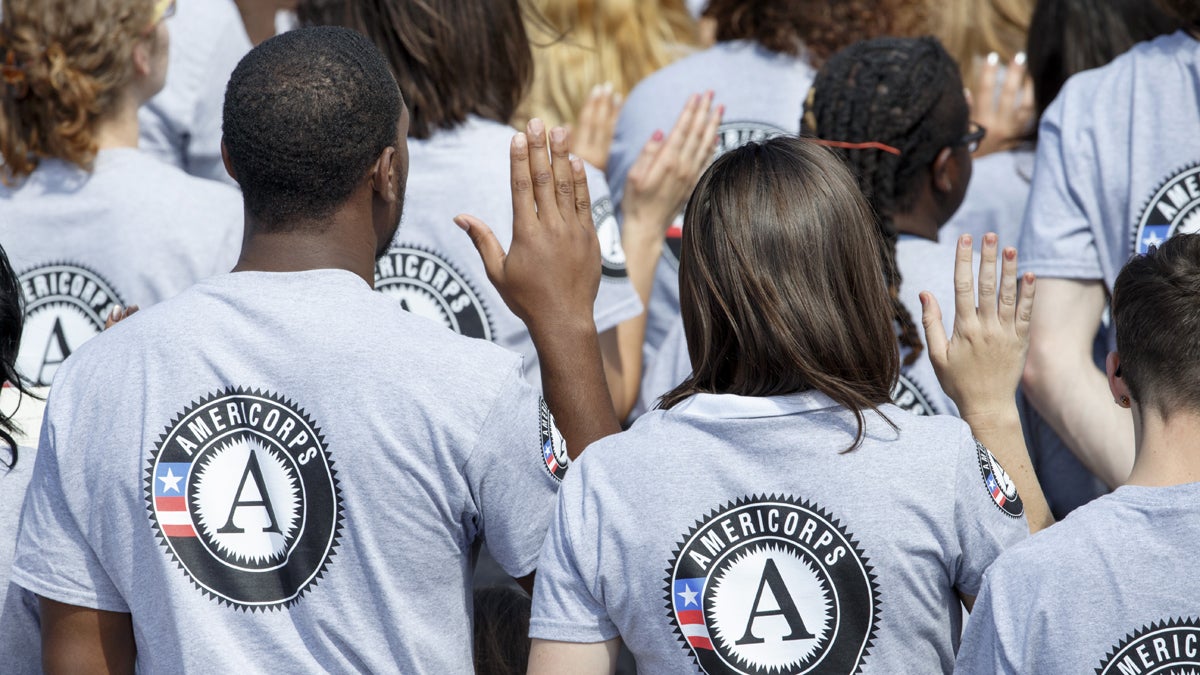National service! (Snore) No, really, a positive issue! (Snore)

Hundreds of new volunteers are sworn in for duty at a ceremony marking the 20th anniversary of the AmeriCorps national service program in 2014. (AP Photo/J. Scott Applewhite)
Bread-and-circus idiocies have terminally soiled this presidential campaign — most recently, Vladimir Putin’s surrogate, peeved at a beauty queen, urged us to “check out sex tape” that doesn’t exist — and that’s truly a shame, because it’s all too easy to overlook the substantive positive issues.
And yes, folks, those issues are out there. Let’s go wild today and flag one.
Last Friday, in the teeth of Donald Trump’s latest toxic tweetstorm, Hillary Clinton unveiled a detailed proposal to create a National Service Reserve, which would ideally recruit as many as five million volunteers (mostly Millennials) for modestly paid work in their communities — helping the homeless, working with opioid addicts, pitching in during natural disasters, whatever is needed. She’d also expand AmeriCorps, the national volunteer program that always has far more applicants than it has positions to fill, and provide financial incentives for AmeriCorps alums to stay in public service.
In her Friday speech about the National Service Reserve, she said: “Some of the assignments will be just a few days, a month. Some might be longer term. But they will all directly address a vital need in your community …. For me, service is about fulfilling the instruction of my Methodist faith. ‘Do all the good you can, in all the ways you can, in all the places you can, at all the times you can, to all the people you can, as long as ever you can.'”
Yeah, I know. Boring, right? Why give her credit for touting something positive and substantive that’s dear to her heart when it’s so much easier and snarkier to talk about Bill’s philandering or her past bout with pneumonia?
The other night, an undecided voter was interviewed on TV, and this woman complained that Clinton doesn’t talk issues, that she has no idea where Clinton stands on issues. I have a suggestion for people like her: Place fingers on the computer keyboard. Move fingers so that they type the URL of Clinton’s campaign site. Use index finger to click the Issues icon.
It’s really quite simple. Within seconds, one is presented with enough substance to make even an ADD sufferer forget the freak show. And the page on National Service is all about enlisting Americans from diverse backgrounds — and ideologies — to work together for common purposes. Which is theoretically what America is still supposed to be about.
This nonpartisan concept has been around for decades. JFK, LBJ, and Bill Clinton championed service volunteerism. Conservative icon William F. Buckley used to talk it up. John McCain called for a major expansion of AmeriCorps after 9/11. And ex-anchorman Tom Brokaw, in one of his recent books, extolled national service as a way for young people to “give back” to the country without joining the military. He said that America has regrettably become “two societies with too little connective tissue,” and, for that reason, “it’s time to renew the ideal of national service for all.”
But, naturally, Hillary Clinton’s Friday address got little attention; heck, I’m betting you didn’t know about it. Which says a lot more about us than it does about her. In a bread-and-circus, sturm-und-drang culture, positive substance is a buzzkill.
What sells is conflict. In a new Clinton administration, national service would generate heat only if conservatives claim that the whole thing is a plot to create Hillary re-education camps. Such a claim would be no doubt be amped by the anchors on Trump TV.
—
The vice-presidential debate is tonight. If the polls are right, roughly half the population has no opinion or knowledge about the debaters. Which probably means that, for many, this debate sounds nearly as boring as the national service issue.
Clinton and Trump generate all the buzz — pro and con, love and hate. And veep debates have rarely if ever influenced the outcome of elections; the most memorable moment in veep debate history — lightweight Dan Quayle’s ’88 humiliation, when he was derided as “no Jack Kennedy ” — didn’t mar George H. W. Bush’s decisive victory.
Nevertheless, Tom Kaine and Mike Pence warrant our attention, and not simply because 32 percent of veeps have risen to the presidency. It’s because they’ll likely be tasked tonight with defending their respective partners.
Kaine may need to explain, for instance, why Clinton has shifted on the Trans-Pacific trade deal (she was against it before she was for it), and why, in his view, the email flap should not be a deal-breaker for undecided voters. Pence may need to explain why it’s fine for Trump to sit on his tax returns, to pay no taxes while average citizens pay theirs, to stoke the birther garbage, and to insult virtually everyone on earth except Putin.
Even so, they’ll probably be boring. But at this point, given our frayed nerves, boring sounds good.
—
Follow me on Twitter, @dickpolman1, and on Facebook.
WHYY is your source for fact-based, in-depth journalism and information. As a nonprofit organization, we rely on financial support from readers like you. Please give today.

